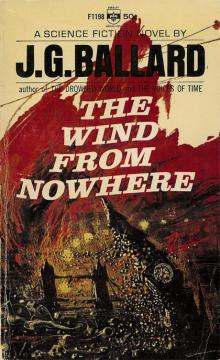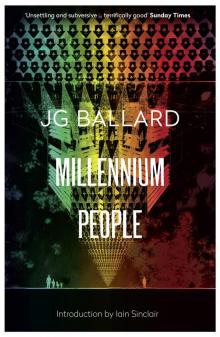- Home
- J. G. Ballard
Super-Cannes Page 10
Super-Cannes Read online
Page 10
A blonde woman in her thirties, dressed in a dark business suit, sat down at a nearby table. She ordered a cappuccino and exchanged a few words of banter with the waitress, but her eyes were fixed on the top floor of the security building, where Pascal Zander had his office. She opened a laptop computer and tapped the keys, throwing up a sequence of property ads for expensive villas on the heights of Super-Cannes and Californie, all furnished with electric-blue lawns and emerald skies. She stared morosely at the overlit photographs and began a typed dialogue with herself, apparently setting out her day’s schedule and answering her queries aloud in an ironic English voice. I imagined her stepping from her shower, towel twirled around her head, keying in the emotions she would feel that day, the memories to be cued, the daydreams to be assigned a few minutes of too-precious time, the whole programme laced with sardonic asides.
During a creative pause she gazed over the tables at me, revealing an attractive but moody face. I marked her down as a professional rebel, who resented the trappings of managerial success, club-class upgrades and company credit cards, the fool’s gold that could buy an entire life and offer no discount for idealism or integrity, and I liked the sombre eye that she levelled at the business park. Her glance took in my open-necked shirt, tweed sports jacket and thong sandals, a garb never worn by anyone in Eden-Olympia at either work or play, but the off-duty dress at my Cyprus RAF base, circa 1978, and the guarantee, I was deluded enough to think, of a certain kind of honesty.
She watched me brush a leaf from my lapel, and a smile moved like a slow tic across her mouth. She sipped her coffee, then pressed a tissue to her lips, leaving the imprint of a crushed kiss on the table. She returned to the laptop, perhaps outlining a cost-benefit analysis of her next affair, the contingency funds to be assigned to minor cosmetic surgery, precautionary visits to the HIV clinic …
As if to encourage the fantasies of the stranger sitting nearby, she kicked off her high-heeled shoes and hitched up her skirt to scratch her stockinged insteps, exposing a satisfying glimpse of white thigh. Despite the smart suit, her blonde hair was a little too blown, giving her the look of a nervy and intellectual tart. Was she a call-girl, computerized like everyone else at Eden-Olympia? Her sceptical stare at the Elf building made it hard to believe that she worked as a contented member of anyone’s team.
A security helicopter patrolled the lake, its soft engine barely audible across the impassive surface. For a few seconds I imagined that it was keeping watch on me after my collision with Wilder Penrose’s car.
I had deliberately damaged the door, paying Penrose back for urging Jane to stay on at Eden-Olympia, but also for the sheer perversity of watching the fibreglass craze and splinter. It reminded me of an outburst of vandalism I had given way to as a boy of seven. My parents were on holiday in France, trying to jury-rig their becalmed marriage and aware that they were always happiest in a foreign country. I was staying with my mother’s sister, a retired character actress with a churchy streak. She was devoted to me, but fiercely proscriptive about the television I was allowed to watch. Almost every programme that I liked seemed to remind her of her lapsed career. One afternoon, when she vetoed a science fiction series in which she appeared as a Martian psychiatrist, I managed to sneak out into the street with a can of spray-paint. In a few thrilling minutes I vandalized her car, aerosolling bizarre hieroglyphs over the doors and windscreen in what I imagined was an interplanetary language.
A traffic warden reported me to my aunt, but she managed to hush up the incident. We both knew that I was trying to punish my parents, but from then on she regarded me as a fallen angel. It no longer mattered what television I watched, a state of disgrace that heartened me for years. Damaging Penrose’s car had been almost as satisfying. For a few seconds, despite myself, I felt like a boy again, with all the covert powers that a disturbed child wielded over the adult world.
The helicopter soared away, reflected in the mirror curtain-walling of the Crédit-Suisse building. The blonde woman with the laptop had gone. Her crushed tissue, still bearing the imprint of her lips, drifted across the floor to my feet. I held the waxy smear to my nostrils, inhaling the faint but potent scent.
A hand gripped my shoulder, almost forcing me to my knees.
‘Paul, so this is where you hide … God, I envy you.’
Wilder Penrose beamed at me, unaware that he had knocked over my wine glass. He took the tissue from my fingers and dabbed at the stained cloth, leaving a vermilion smear. He wore another of his linen suits, a black silk tie fluttering like a miniature noose from his heavy throat. His eyes watched me in their unblinking way, detached from the rest of his face and from the broad smile that seemed to signal his genuine pleasure at finding me.
‘Paul, I’m sorry – away from the clinic I’m unbelievably clumsy. Let’s get you another drink.’ Penrose signalled to the waitress, and gazed around him with unfeigned delight. ‘It’s lovely here. Luckily, I have a quiet day.’
‘No patients? Isn’t that a mark of success?’
‘Sadly, there isn’t a doctor in the world who would agree with you.’
When the waitress served his coffee Penrose broke open a sachet of sugar. His fingers were as awkward as a child’s, and the loose grains clung to his knuckles when he sank his broad upper lip through the chocolate-speckled foam. Behind him, the waitress was clearing the blonde woman’s table. She had left a mess of debris, tissues stained with coffee, cream spilt onto the paper cloth. Were bad table manners a quirk of Eden-Olympia’s executive class, a safety valve for corporate tensions?
The Japanese sports saloon was parked near the lake, the dent in its door clearly visible. Penrose followed my gaze.
‘Do you want a spin? It’s an interesting car. Rather like your Harvard, I imagine.’
‘Another time.’ Calmly, I said: ‘You’ve had a bump. Cutting corners too fast?’
‘Only in my professional life. Those clochards in Cannes, mostly old soixante-huitards. They see a tribute to modern industrial genius and can’t resist giving it a swift kick.’
Penrose watched me while he spoke, head lowered over his coffee as he licked up the foam, well aware that I had damaged the car. Surprisingly, I felt no guilt, almost as if I had acted with his approval.
‘Now, what’s the verdict on Eden-Olympia? You’ve settled in?’
‘That took ten minutes. The villa is very comfortable – for a haunted house.’
‘Good. And Señora Morales?’
‘The body and soul of discretion. She wouldn’t be shocked if I sneaked a fourteen-year-old up to the bedroom.’
‘You should try it …’ Penrose used his forefinger to clean the last drops from his cup. ‘Of course, in her eyes you already have.’
‘Jane? She’s more mature than she looks.’
‘I work with her, Paul. She’s wiser than I’ll ever be. As it happens, prepubertal betrothals are still common in rural Spain. It helps to advance the menarche and accelerate the supply of young farmhands. What about your neighbours?’
‘We’ve met the Delages. Very new Europe, and extremely helpful. Mrs Yasuda bows to me, but I haven’t got closer than thirty feet.’
‘People at Eden-Olympia don’t mix. It’s a problem we’re working on. By the time they get home they want to be alone, fix a martini, swim a few lengths. Their true social life is the office.’
‘That sounds like a design error. Jane and I go into Cannes just to talk to the tourists at the next table.’
‘I’ve tried that – odd, isn’t it?’ Penrose muffled his voice. ‘Don’t they seem a little strange?’
‘Tourists in Cannes?’
‘People outside Eden-Olympia. In some way a dimension is missing. There’s a lack of self-corroboration. They stroll along the Croisette, talk about their flights to Düsseldorf and Cleveland, but it’s all unreal. If you stand back for a moment, tourists are a very odd phenomenon. Millions of people crossing the world to wander around unfamiliar cities. Tourism must
be the last surviving relic of the great Bronze Age migrations.’
‘So they should stay at home?’
‘Yes, but that won’t help them. Go into Cannes and look around – the checkout girls at the Monoprix, the chauffeur walking a poodle, the dentist and his receptionist having their cinq à sept in a backstreet hotel. They’re like actors improvising their roles, unaware that the production has moved on.’
‘To Eden-Olympia? I haven’t seen a copy of the script.’
‘It’s still being written. We’ll all take part – the Delages, you and Jane and Mrs Yasuda. It’s the only script that matters.’
‘Let me guess.’ I finished my wine and placed the empty glass in front of Penrose, wondering how long it would take him to knock it over. ‘The characters never meet, except in the office. There’s no drama and no conflict. There are no clubs or evening classes …’
‘We don’t need them. They serve no role.’
‘No charities or church fêtes. No fund-raising galas.’
‘Everyone is rich. Or at least, very well off.’
‘No police or legal system.’
‘There’s no crime, and no social problems.’
‘No democratic accountability. No one votes. So who runs things?’
‘We do. We run things.’ Penrose spoke soothingly, exposing his badly bitten nails as if trying to present himself as vulnerable but sincere. ‘Years ago people took for granted that the future meant more leisure. That’s true for the less skilled and less able, those who aren’t net contributors to society.’
‘Such as?’
‘Poets, traffic wardens, ecologists …’ Penrose gestured dismissively, and struck my wine glass with his hand. He settled it on the table, embarrassed by his clumsiness, and continued: ‘I’m being unfair, but I know you agree with me. For the talented and ambitious the future means work, not play.’
‘Depressing. No recreation at all?’
‘Only of a special kind. Talk to senior people at Eden-Olympia. They’ve gone beyond leisure. Playing around with balls of various shapes and sizes…’ Penrose tripped over his tongue, and paused to flex his lips. ‘That’s something they left behind in childhood. Work is where they find their real fulfilment – running an investment bank, designing an airport, bringing on stream a new family of antibiotics. If their work is satisfying people don’t need leisure in the old-fashioned sense. No one ever asks what Newton or Darwin did to relax, or how Bach spent his weekends. At Eden-Olympia work is the ultimate play, and play the ultimate work.’
‘There’s one thing missing. All I see are a lot of office buildings and car parks in a faked-up landscape. What happens to the law and the church? Where are the moral compass bearings that hold everything together?’
‘They fall away. We shed them, like that brace you got rid of once you could stand on your own legs.’
‘So Eden-Olympia has gone beyond morality?’
‘In a sense, yes.’ Controlling his clumsy hands, Penrose moved my wine glass to the next table. ‘Remember, Paul, the old morality belonged to a cruder stage of human development. It had to cope with packs of hunter-scavengers who’d only just left the Serengeti plain. The first religions were forced to deal with barely socialized primates who’d tear each other’s arms off given half a chance. Since they couldn’t rely on self-control they needed ethical taboos to do it for them.’
‘So, goodbye to the old morality. What then?’
‘Freedom. A giant multinational like Fuji or General Motors sets its own morality. The company defines the rules that govern how you treat your spouse, where you educate your children, the sensible limits to stock-market investment. The bank decides how big a mortgage you can handle, the right amount of health insurance to buy. There are no more moral decisions than there are on a new superhighway. Unless you own a Ferrari, pressing the accelerator is not a moral decision. Ford and Fiat and Toyota have engineered in a sensible response curve. We can rely on their judgement, and that leaves us free to get on with the rest of our lives. We’ve achieved real freedom, the freedom from morality.’
Penrose sat back, hands raised to the air, part conjuror and part revivalist preacher. He was watching me to see how I reacted, less interested in converting me than in extracting a grudging concession that he might be right. At some point in his life, at his medical school or during his psychiatric training, someone had failed to take him seriously.
Unconvinced by his case, I said: ‘It sounds like a ticket to 1984, this time by the scenic route. I thought organization man died out in the 1960s.’
‘He did, our worried friend in the grey-flannel suit. He was an early office-dwelling hominid, a corporate version of Dawn Man who assumed a sedentary posture in order to survive. He was locked into a low-tech bureaucratic cave, little more than a human punch-card. Today’s professional men and women are self-motivated. The corporate pyramid is a virtual hierarchy that endlessly reassembles itself around them. They enjoy enormous mobility. While you’re mooning around here, Paul, they’re patenting another gene, or designing the next generation of drugs that will cure cancer and double your life-span.’
‘I’m impressed. Eden-Olympia is the new paradise. You should put up a sign.’
‘We might, one day, but we don’t want to boast.’ Penrose beamed at me, broad smile lighting up his dead eyes. ‘At long last, people are free to enjoy themselves, though most of them haven’t realized it yet. In many ways I’m a kind of leisure coordinator. I run the adventure playground inside their heads. It’s open to everyone here. You can explore your hidden dreams, the secret places of your heart. You can follow your imagination, wherever it leads.’
‘Ennui, adultery and cocaine?’
‘If you want to, but they’re rather old-fashioned. You’re a pilot, Paul, you’ve flown above the clouds. You owe it to yourself to be more inventive.’
‘That sounds like a head-on collision with the law. Or a new kind of psychopathology.’
‘Paul …’ Pretending to be exasperated, Penrose leaned back with a deep sigh. ‘The rich know how to cope with the psychopathic. The squirearchy have always enjoyed freedoms denied to the tenant farmers and peasantry. De Sade’s behaviour was typical of his class. Aristocracies keep alive those endangered pleasures that repel the bourgeoisie. They may seem perverse, but they add to the possibilities of life.’
‘That’s a curious thing for a psychiatrist to say.’
‘Not at all. Perverse behaviours were once potentially dangerous. Societies weren’t strong enough to allow them to flourish.’
‘But Eden-Olympia is strong enough?’
‘Of course.’ Penrose spoke soothingly, as if to a favourite patient. ‘You’re free here, Paul. Perhaps for the first time in your life.’
Penrose was watching me, curious to see my reactions, a forgotten smile lingering on his lips like a tide-mark. I wondered why he was making this evangelical play for me, and whether he had talked to Jane. Then I thought of another, more impressionable doctor.
‘Free? It’s hard to know how loose the handcuffs really are. Did you discuss this with David Greenwood?’
‘Probably. I’m something of a proselytizer. The middle classes have run the world since the French Revolution, but they’re now the new proletariat. It’s time for another elite to set the agenda.’
‘How did David take all this?’
‘I think he agreed. By the way, he visited me professionally.’
‘What was his problem? Too much sympathy for the poor and orphaned?’
‘I can’t disclose that.’ Penrose smoothed his silk tie. ‘He was a generous man, likeable in a boyish way. But … very repressed.’
‘Sexually?’
‘A little. I wanted David to be more robust, to strike out more fearlessly.’
‘Where?’ I gestured at the lake and the sun-filled atria of the office buildings. ‘I don’t see a rainforest waiting for its Dr Livingstone. He shot ten people. Three of them in the back as they ran awa
y from him.’
‘I know. Zander told me about the bullets. That’s why I dropped by. I can see you’re unsettled.’ Penrose chewed on a thumbnail, pensively sniffing the eroded crescent. ‘David could be very naive, as he showed with his Lewis Carroll society. He didn’t realize that the French see the Alice books as a realistic picture of English life. Eden-Olympia failed David Greenwood, and we paid a heavy price. At least there were only ten deaths.’
‘Only?’
‘There’s a rumour that he planned to kill more than ten people.’ Penrose stared over my head into some private space, and rose heavily from the table. ‘I must go. I’ll tell Jane you’re idling away here.’
‘She won’t mind. Work is all she thinks about.’
‘Paul? That’s close to self-pity.’ Penrose raised a reproving finger. ‘She’s running a new computer model, tracing the spread of nasal viruses across Eden-Olympia. She has a hunch that if people moved their chairs a further eighteen inches apart they’d stop the infectious vectors in their tracks.’
‘I thought people here were too far apart as it is.’
‘Only in some ways. If the dance floor is less crowded you can really do your stuff.’ Penrose pumped his arms in an energetic twist that knocked his chair to the floor. He stood behind me, large hands on my shoulders, as if reluctant to leave. ‘The dance floor’s empty, Paul. Make the most of it. If you want to, pick your tune …’
I listened to the fading burble of his exhaust, and then returned to my scrutiny of the lake. In front of me lay Penrose’s debris, the swamped saucer, soaked tissues and coffee-stained sugar sachets. A passer-by would assume that he had been spoonfeeding a child.
A spoon of a notional kind had been pushed towards me, but what titbit lay inside it? I guessed that Penrose was using me to explore the Greenwood murders, to act as his proxy in an investigation he declined to share. Rather too casually, he had thrown in the ‘rumour’ that there had been other intended victims.

 High-Rise
High-Rise The Drowned World
The Drowned World The Unlimited Dream Company
The Unlimited Dream Company Running Wild
Running Wild The Day of Creation
The Day of Creation The Wind From Nowhere
The Wind From Nowhere The Complete Short Stories, Volume 2
The Complete Short Stories, Volume 2 Concrete Island
Concrete Island Empire of the Sun
Empire of the Sun The Kindness of Women
The Kindness of Women Vermilion Sands
Vermilion Sands Super-Cannes
Super-Cannes Millennium People
Millennium People The Complete Stories of J. G. Ballard
The Complete Stories of J. G. Ballard Crash
Crash The Drought
The Drought The Atrocity Exhibition
The Atrocity Exhibition The Complete Short Stories: Volume 1
The Complete Short Stories: Volume 1 Miracles of Life: Shanghai to Shepperton: An Autobiography
Miracles of Life: Shanghai to Shepperton: An Autobiography Rushing to Paradise
Rushing to Paradise Chronopolis
Chronopolis Cocaine Nights
Cocaine Nights High Rise (1987)
High Rise (1987) The Complete Short Stories
The Complete Short Stories The Day of Creation (Harper Perennial Modern Classics)
The Day of Creation (Harper Perennial Modern Classics) The Crystal World
The Crystal World